Common Core & Utrecht University
Critical Zones: Local and Planetary Flourishing
Transdisciplinary Research Exchange 2023
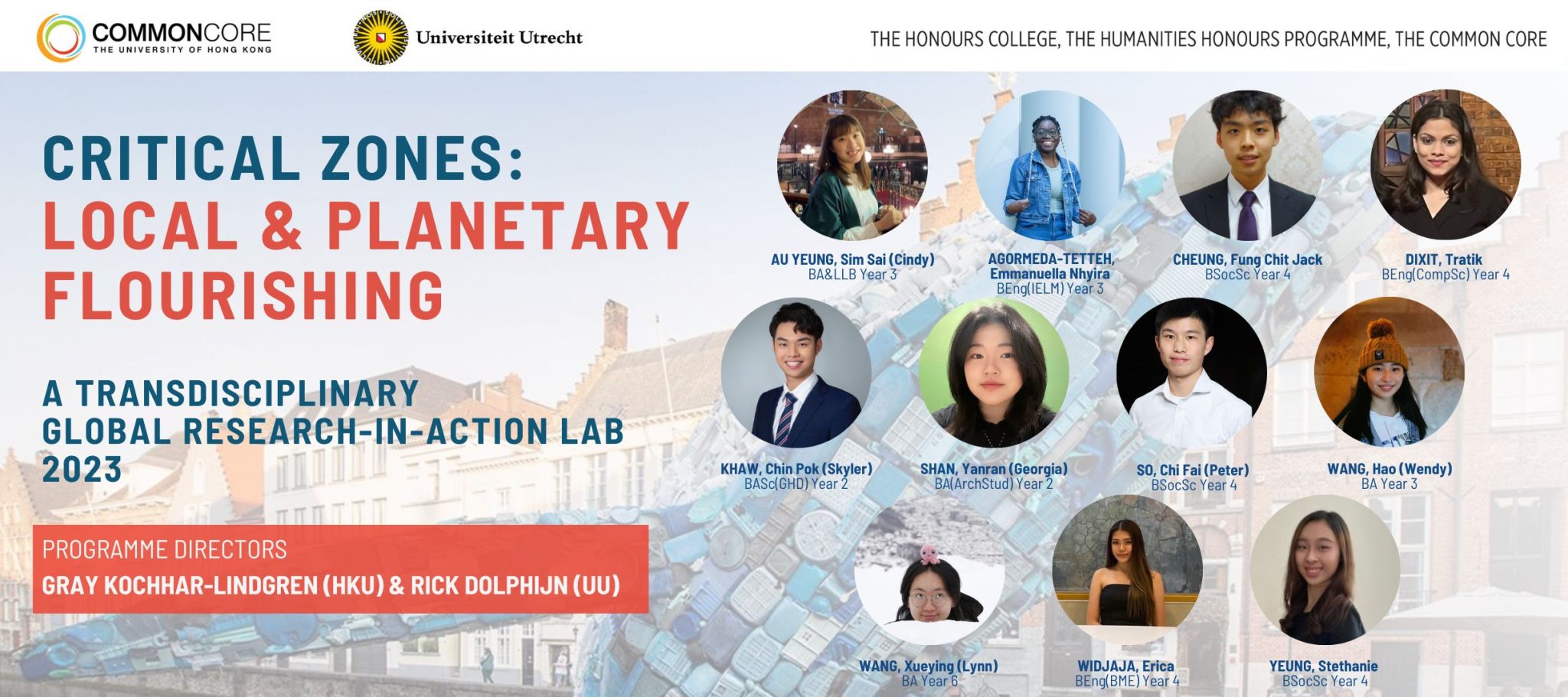
Critical Zones: Local and Planetary Flourishing is an undergraduate transdisciplinary research Global-Action-Lab between HKU and Utrecht University (Netherlands) that has been running since 2016. Co-directed by Professor Gray Kochhar-Lindgren—formerly the Director of the Common Core —and Dr. Rick Dolphin in Philosophy, Culture, and Media Studies at UU, the exchange focuses on building transdisciplinary collaborative, research, and project management skills for the students.
The 2022-23 version of the exchange programme explored the concept of “critical zones” made popular first by research networks of earth scientists and then translated more broadly by Bruno Latour, one of the most important philosophers and sociologists of the anthropocene.
This expansive, but necessarily precise, concept allowed the students to bring their disciplinary knowledge to bear on a topic of deep personal interest and then to connect that knowledge and interest to others in both their HKU cohort—drawn from across the Faculties—and to their UU peers. Out of this first-level “zone of attention,” the students then read a series of texts mediated by the Directors, did on-the ground research in both Hong Kong and Utrecht (and the environs), and then co-created an 8-minute video for the purposes of articulation, dissemination, and impact.
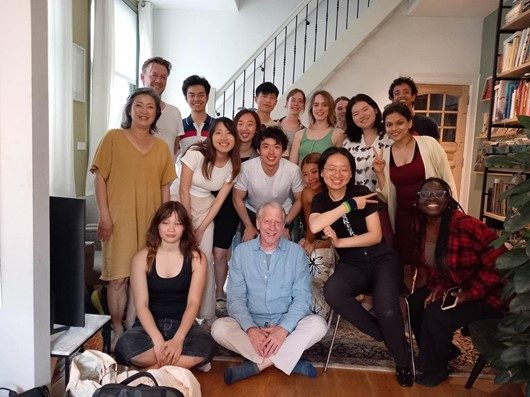
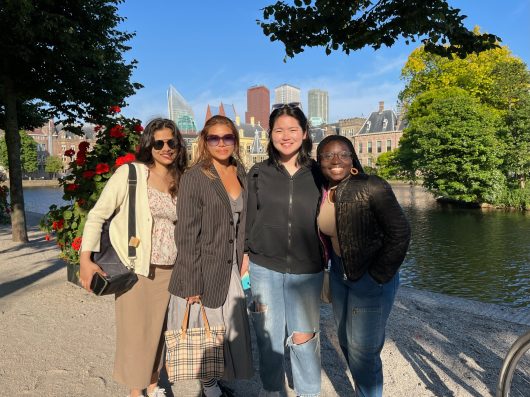
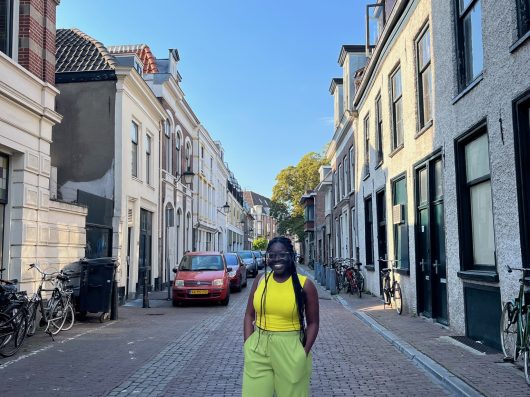
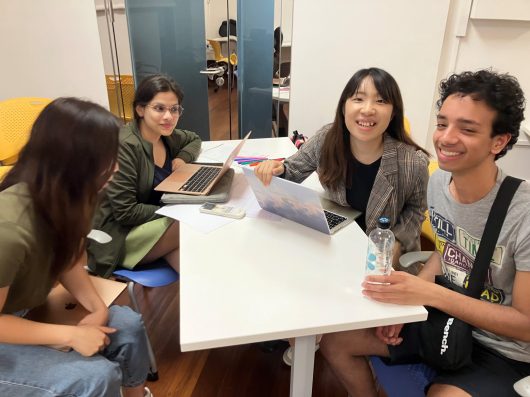
Student Projects
The City as a Forest
| HKU | UU |
|---|---|
| AU YEUNG Sim Sai (Cindy) | Xavian Gabriel Daflaar |
| KHAW Chin Pok (Skyler) | Logan Embregts |
| SHAN Yanran (Georgia) | Nora Janssen |
| SO Chi Fai (Peter) | |
| WANG Xueying (Lynn) | |
| Stethanie YEUNG |
Finding the Eye of the Storm
| HKU | UU |
|---|---|
| Emmanuella Nhyira AGORMEDA-TETTEH | Marleen Melisse |
| Tratik DIXIT | Pauline Scherer |
| CHEUNG Fung Chit Jack | Xavian Gabriel Daflaar |
| WANG Hao (Wendy) | |
| Erica WIDJAJA | |
| Stethanie YEUNG |
Critical Zones: Local and Planetary Flourishing
Student Testimonials
CHEUNG Fung Chit Jack
On a personal note, although the practice of transdisciplinary research is not alien to me, the concept of critical zones is truly alien, and I dare not to claim that even after this experience under the guidance of amazing academics and collaborative work amongst diverse peers, that I fully understand all the perspectives of this potentially paradigm-shattering idea. However, I firmly believe that this exchange has indeed broadened my personal limits and expectations of what research on a macro level can be like, as well as building connections with people I would otherwise never have met in my routine life.

Emmanuella Nhyira AGORMEDA-TETTEH
I enjoyed collaborating with students across different faculties and exploring this transdisciplinary endeavour. This experience helped me to have a more rounded approach to understanding knowledge produced by both artists and scientists. Through this programme, I had the opportunity to expand my understanding and perspective of considering the city beyond the present day and to be increasingly aware of the possibilities that lie in. I also gained insight into the interdependence between the human and the non-human elements of the city such as how the weather might affect a person’s mood. In addition, immersing myself in the Netherlands landscape allowed me to learn more about sustainable practices and infrastructure to support city dwelling. I also had the freedom to consider how I could potentially develop projects across cities and across processes in the future having participated in this exchange.

AU YEUNG Sim Sai (Cindy)
Transdisciplinary study is a lifelong lesson that we must embrace, as it necessitates accepting that people around us come from diverse backgrounds. This program has reaffirmed my belief that the world is immense, and there are countless places to discover, cultures to immerse myself in, and perspectives to encounter.

WANG Xueying (Lynn)
I do feel that the process of identifying the critical zone is highly contextual, even personal. The critical issues that one concerns about are affected by the trajectory that one takes.

KHAW Chin Pok (Skyler)
My exchange trip to Utrecht and Amsterdam offered a profound understanding of critical zones and their impact on cities. I realized that the harmonious coexistence of humans, nature, and technology required a multidisciplinary approach that considered social, economic, and environmental factors. Moreover, I came to appreciate the significance of community engagement, collective responsibility, and sustainable practices in nurturing critical zones and building resilient cities. As a student from a very interdisciplinary background of training, I am so glad to see that this macroscopic and newer way of thinking and teaching, not to mention experiential learning being incorporated into the schooling systems, allowing more students to learn to see things not from only one academic angle, but varied, contrasting, and sometimes even conflicting angles.

WANG Hao (Wendy)
The ‘Critical Zones: Local and Planetary Flourishing: Transdisciplinary Research Exchange 2023’ is a great experience. I am grateful for our two instructors, Rick and Gray, who are helpful mentors and supportive advisors for our projects and our growth. I also feel very fortunate and happy to meet our lovely and friendly Dutch fellow students and learn from each other.

Tratik DIXIT
To conclude, this was a once-in-a-lifetime opportunity for me, which was not only intellectually stimulating but also allowed me to travel and explore a beautiful and culturing rich city and make new (and hopefully some) lifelong friends.

SHAN Yanran (Georgia)
This project is by far the most unusual and demanding one I have ever participated in – not regarding submission requirements or criteria. We were given so much freedom and so few restrictions and criteria … We were the project’s designers …
… the readings and discussions helped us better understand critical zones’ meaning. I did not fully understand the readings, but I enjoyed hearing and participating in the discussions. I am sure that some of the content would stick with me and come back alive at this unusual time of my life and inspire me.

Erica WIDJAJA
Being exposed to a one-dimensional STEM education my whole life, I felt uncomfortable voicing out my abstract and philosophical opinions to the group in fear of sounding superficial or being incorrect. Still, the discussions were always stimulating and illuminating. Naturally, overtime, I became increasingly engaged in discussion. While some statements were cerebrally abstract to me, they had the surprising ability to trigger an indescribable emotional response. Other times, I melted into the backdrop and emulated a sponge, absorbing and committing to memory the details of the conversation which I found interesting and thought-provoking.

Stethanie YEUNG
This transdisciplinary global research project was for sure a fruitful and memorable experience. I have learnt much from our programme directors, guest speakers and international peers. From the programme itself, the transdisciplinary design has created the opportunity for me to interact with and learn from bright minds across different fields, allowing me a more holistic understanding of the world around us.

SO Chi Fai (Peter)
The research exchange experience at Utrecht University in the Netherlands provided a unique opportunity for me to investigate the critical zones in a different urban context when compared to Hong Kong. The experience in Utrecht has been a valuable journey that has provided deep insights into the complexities of Utrecht and Hong Kong.
This unique experience undoubtedly broadens my view and connects me with a country on an unparalleled level, allowing me to be more accepting and open-minded to foreign cultures. It also makes me more aware of my identity as a global citizen and how connecting with people across the globe would enrich my understanding and interest towards the very world I am living in.




